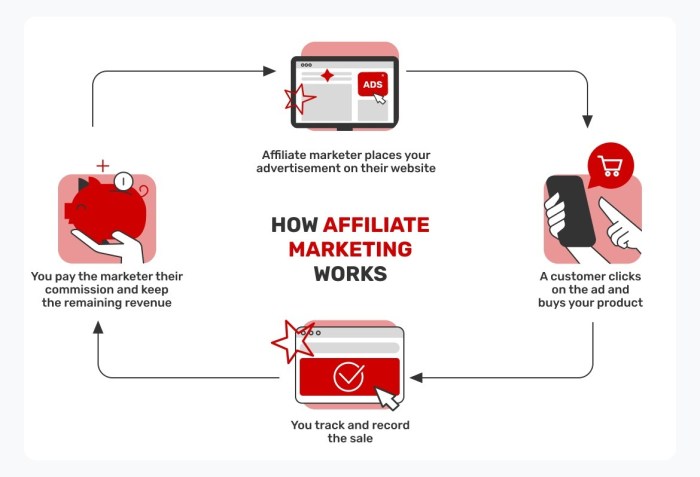
Step into the world of Affiliate marketing in e-commerce, where opportunities abound and sales soar. Get ready for an exciting journey filled with insights and strategies to elevate your online business game!
Learn about the power of affiliate marketing, its impact on e-commerce, and how you can leverage it to drive success in your online store.
Introduction to Affiliate Marketing in E-commerce
Affiliate marketing in e-commerce is a performance-based marketing strategy where businesses reward affiliates for driving traffic or sales to their website through the affiliate’s marketing efforts. This form of marketing is prevalent in the e-commerce industry due to its cost-effective nature and ability to reach a wider audience through various online channels.
How Affiliate Marketing Works in E-commerce
Affiliate marketing works by allowing affiliates to promote a company’s products or services through unique tracking links. When a customer clicks on the affiliate link and makes a purchase, the affiliate earns a commission. This commission can be based on a percentage of sales, a flat fee per transaction, or other predetermined metrics. The tracking of these links is crucial in ensuring affiliates are properly credited for their efforts.
- Affiliates create content (such as blog posts, social media posts, or videos) promoting the products or services of the e-commerce store they are affiliated with.
- Customers click on the affiliate’s unique tracking link and are redirected to the e-commerce store to make a purchase.
- If a customer makes a purchase through the affiliate’s link, the affiliate earns a commission for driving that sale.
Successful Affiliate Marketing Programs in E-commerce
Some examples of successful affiliate marketing programs in e-commerce include:
- Amazon Associates: Amazon’s affiliate program allows affiliates to earn commissions by promoting a wide range of products available on the Amazon platform.
- Rakuten Marketing: Rakuten offers a comprehensive affiliate marketing network that connects advertisers with publishers to drive sales and revenue.
- CJ Affiliate (formerly Commission Junction): CJ Affiliate is a popular affiliate marketing network that provides a platform for both advertisers and publishers to collaborate on marketing campaigns.
Benefits of Affiliate Marketing for E-commerce Businesses

Affiliate marketing offers numerous advantages for e-commerce businesses, helping them increase sales, expand their reach, and enhance brand visibility.
Cost-effective Marketing Strategy
- Affiliate marketing is performance-based, meaning businesses only pay for actual sales or leads generated by affiliates, making it a cost-effective option.
- Compared to traditional advertising methods, affiliate marketing often results in a higher return on investment (ROI) due to its pay-for-performance model.
Increased Brand Exposure
- By partnering with affiliates, e-commerce businesses can tap into new audiences and markets that they may not have reached through their own marketing efforts.
- Affiliates can help promote products or services to their own followers, expanding brand visibility and awareness across different channels.
Enhanced Credibility and Trust
- Consumers often trust recommendations from influencers or content creators more than traditional advertisements, leading to higher conversion rates for businesses involved in affiliate marketing.
- Affiliates act as brand advocates, sharing their positive experiences with products or services, which can build credibility and trust with potential customers.
Setting Up an Affiliate Marketing Program
Setting up an affiliate marketing program for your e-commerce store can be a great way to boost sales and increase brand awareness. It involves partnering with individuals or other businesses (affiliates) who promote your products or services in exchange for a commission on sales generated through their unique affiliate links.
Criteria for Selecting Affiliate Partners
When selecting affiliate partners for your e-commerce store, it’s essential to consider the following criteria:
- Relevance: Choose affiliates whose audience aligns with your target market to ensure maximum impact.
- Quality: Look for affiliates with a good reputation and high-quality content to maintain your brand’s image.
- Reach: Opt for affiliates with a significant online presence and a large following to reach a wider audience.
- Engagement: Prioritize affiliates who have a high level of engagement with their audience to drive conversions effectively.
- Performance: Track the performance of potential affiliates to gauge their effectiveness in driving sales and ROI.
Tips for Managing and Optimizing an Affiliate Program
To effectively manage and optimize your affiliate program, consider the following tips:
- Clear Guidelines: Provide affiliates with clear guidelines, including commission structure, promotional tactics, and brand messaging.
- Communication: Maintain open communication with affiliates to address any issues, provide support, and share updates on promotions or products.
- Performance Tracking: Use analytics tools to track affiliate performance, monitor conversions, and optimize campaigns for better results.
- Incentives: Offer incentives such as bonuses, exclusive discounts, or rewards to motivate affiliates and boost their performance.
- Regular Evaluation: Continuously evaluate the performance of affiliates, adjust strategies as needed, and cultivate strong relationships for long-term success.
Marketing Strategies for E-commerce Businesses
In the competitive world of e-commerce, having effective marketing strategies is crucial for success. Let’s explore different marketing strategies that complement affiliate marketing in e-commerce and discuss the role of social media, content marketing, and in e-commerce marketing.
Social Media Marketing
Social media has become a powerful tool for e-commerce businesses to reach their target audience. By leveraging platforms like Facebook, Instagram, and Twitter, businesses can engage with customers, drive traffic to their website, and increase sales. Through affiliate marketing, businesses can partner with influencers or bloggers to promote their products on social media, reaching a wider audience and driving conversions.
Content Marketing
Content marketing plays a vital role in e-commerce marketing by providing valuable information to customers, building brand awareness, and driving organic traffic to the website. By creating high-quality content such as blog posts, videos, and infographics, e-commerce businesses can establish themselves as industry experts and attract potential customers. Affiliate marketing can be integrated into content marketing strategies by collaborating with affiliate partners to create engaging content that promotes products and drives sales.
(Search Engine Optimization)
is essential for e-commerce businesses to improve their visibility in search engine results and drive organic traffic to their website. By optimizing website content, meta tags, and backlinks, businesses can increase their chances of ranking higher on search engine results pages. Affiliate marketing can complement efforts by generating backlinks from affiliate websites, increasing website authority and improving search engine rankings.
Examples of Successful Marketing Campaigns
One successful marketing campaign that integrated affiliate marketing is the partnership between fashion brand Nordstrom and fashion blogger Chiara Ferragni. By collaborating with Chiara, Nordstrom was able to reach a larger audience, drive sales, and increase brand awareness. Another example is Amazon’s affiliate program, which allows website owners to earn commissions by promoting Amazon products on their websites, driving traffic and sales for both parties.
Last Word

As we wrap up our discussion on Affiliate marketing in e-commerce, remember that the key to thriving in the digital landscape lies in strategic partnerships and innovative marketing approaches. Take these learnings and watch your business flourish!
Questions Often Asked
How does affiliate marketing impact e-commerce businesses?
Affiliate marketing can significantly boost sales and brand exposure for e-commerce businesses by leveraging partnerships with affiliates to drive traffic and conversions.
What are the advantages of using affiliate marketing in e-commerce?
Affiliate marketing offers a cost-effective way to reach a broader audience, increase sales, and build brand credibility through third-party endorsements.
How can e-commerce stores effectively manage their affiliate marketing programs?
E-commerce stores can manage affiliate programs by setting clear goals, providing affiliates with necessary resources, tracking performance metrics, and fostering strong communication channels.
Can affiliate marketing work alongside other marketing strategies in e-commerce?
Absolutely! Affiliate marketing can complement other strategies such as social media marketing, content marketing, and to create a comprehensive and effective marketing approach.





